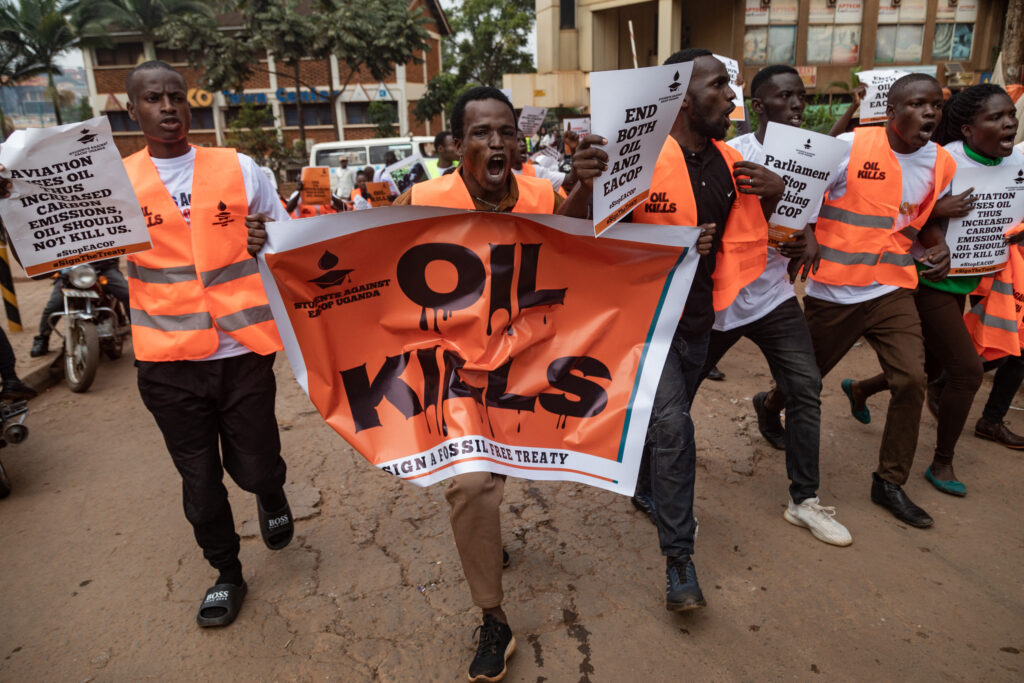Amid New York’s “Climate Week,” an international people’s tribunal spotlighted the ecosystems and communities impacted by fossil fuel projects.
Representatives from global communities, scientists, and advocates shared stories of displacement, health degradation, economic ruin, and lost histories to the International Tribunal on the Rights of Nature on Sunday.
In India, coal mines threaten endangered elephants sacred to Adivasi Indigenous people. In Louisiana, petrochemical facilities disrupt sacred grave sites. In East Africa, an oil pipeline displaces communities and wildlife. In Peru, decades-old crude production and over 1,000 oil spills lead to new refinery installations and expanded operations.
The tribunal, in its sixth session since 2014, probes alleged violations of the 2010 Universal Declaration on the Rights of Mother Earth, which recognizes nature as a living being with inherent rights.
“Just as human beings have human rights, all other beings also have rights specific to their species,” the nonbinding declaration states. It was written during a 2010 people’s conference in Bolivia following a disappointing UN climate summit in Copenhagen.
The tribunal is part of the growing “rights of nature” movement, which has led to laws recognizing nature’s rights in over a dozen countries, including Ecuador, Panama, Spain, New Zealand, Brazil, Colombia, and Uganda. However, enforcement remains limited.
The Global Alliance for the Rights of Nature created the tribunal to demonstrate potential legal systems recognizing nature’s rights. Past hearings have addressed the Deepwater Horizon Oil Spill, lithium mining in Chile, and the impact of free trade agreements on the environment. Despite nonbinding rulings, the tribunal’s website claims its work pressures governments by drawing international attention.
Yolanda Esguerra, a Filipino activist who testified about oil spills affecting coral reefs, said the tribunal strengthens her resolve to push for rights of nature legislation. “It gives you a sense that you’re not alone,” she said.
The Philippines, like many countries represented at the hearing, is a dangerous place for environmental defenders. Filipinos resisting ecologically harmful projects face abduction, lawsuits, and being labeled terrorists.
Sunday’s hearing also addressed “false solutions” to climate change, such as geoengineering and carbon markets. Paganga Pungowiyi, an Indigenous mother from Sivungaq in the Bering Strait, criticized an “Arctic Ice Project” for not adequately consulting local Indigenous communities.
The hearing also highlighted new oil and gas projects in Africa. Biologist Daniel Ribeiro from Mozambique reported gas extraction affecting endangered marine species and displacing local communities reliant on marine life and farming. Increased industry boat traffic causes more ship-strike deaths of species like humpback whales.
Mozambique is among many countries expanding fossil fuel production despite the rise of low-carbon technologies. Governments from the U.S. to India are increasing oil and gas production to meet growing demand.
“India is rapidly expanding renewable energy, but that’s obscuring the growth of coal,” said Maduresh Kumar, an Indian climate justice activist. India’s state-run coal company plans 21 new mines or expansions, affecting the biodiverse Hasdeo Arand Forest, home to 15,000 Adivasi Indigenous people and endangered species.
Frustration with existing laws and their lack of enforcement was a common theme. Communities like those along Louisiana’s Cancer Alley experience severe pollution and land degradation impacts.
“Our air smells like rotten eggs, we’re losing a football field of wetlands every hour, and our groundwater levels are receding at an alarming rate,” said Sharon Levine, director of RISE St. James.
The hearing included success stories, such as the grassroots campaign that pressured the U.S. government to halt the Keystone XL pipeline project. “We’ve stood up for over 500 years to the face of extinction, and we’re not going away,” said Julie Horinek of the Ponca Nation of Oklahoma.
Sunday’s hearing was the first of a two-part series on the global transition away from fossil fuels. The second hearing, “The Post Extractivism Non-Mining Era,” will take place in Toronto in March 2025.
The tribunal was led by President Judge Patricia Gualinga, a Kichwa leader from Ecuador, with judges from the U.S., Canada, the Ponca of Oklahoma, and the Navajo Nation/huŋka Bdewakaƞtoƞwaƞ Dakota.
Original Story at insideclimatenews.org
